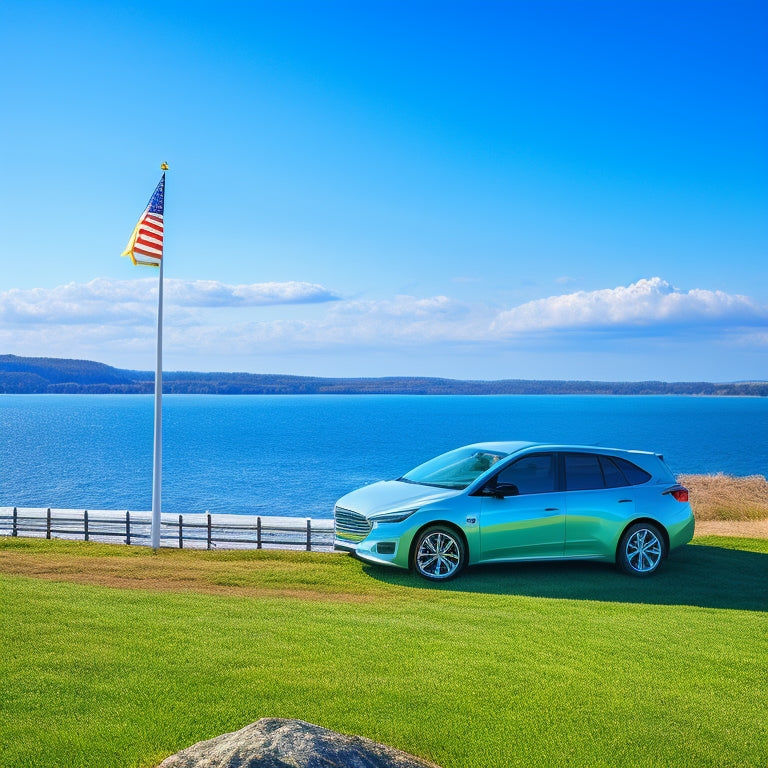
Maryland Boosts Electric Vehicles With Tax Benefits
Share
To promote the adoption of electric vehicles in Maryland, staying informed about the evolving landscape of incentives and benefits is crucial. The state is accelerating the uptake of EVs by providing a range of tax benefits, including credits and rebates, to decrease the initial costs of purchasing and owning an electric vehicle in the region. Maryland offers tax credits for EV purchases and rebates for the installation of charging equipment. Moreover, utility companies in Maryland offer incentives such as time-of-use rates and workplace charger rebates, highlighting the state's dedication to encouraging EVs and fostering an environment conducive to widespread adoption. As Maryland continues to invest in EV infrastructure, it is vital to stay updated on the changing incentives and advantages available.
Key Takeaways
• Maryland offers tax credits and rebates for electric vehicle (EV) purchases, reducing upfront costs for eligible buyers.
• The state provides rebates for EV charging equipment installation, supporting the adoption of sustainable transportation.
• Federal EV incentives, including the Alternative Fuel Infrastructure Tax Credit, also apply to Maryland residents.
• Utility companies in Maryland, such as BGE, Pepco, and Delmarva Power, offer discounts and rebates for EV owners.
• Maryland's state and local initiatives, like the Workplace Charging Grant and Electric Corridors Grant Program, promote EV infrastructure development.
Federal EV Incentives Overview
The federal government offers various incentives to encourage the adoption of electric vehicles, including the Alternative Fuel Infrastructure Tax Credit and the Commercial Electric Vehicle (EV) and Fuel Cell Electric Vehicle (FCEV) Tax Credit, among others. These federal EV incentives provide financial benefits to individuals and businesses investing in electric vehicles and related infrastructure.
The Alternative Fuel Infrastructure Tax Credit offers up to 30% of the cost or $100,000 per item for qualified fueling equipment. The Commercial EV and FCEV Tax Credit provides a credit for businesses and tax-exempt organizations. Additionally, individual consumers can claim a tax credit of up to 30% of the cost or $1,000 for qualified fueling equipment.
These federal EV incentives and electric vehicle tax credits aim to promote the widespread adoption of electric vehicles nationwide.
Maryland State EV Incentives
In Maryland, a suite of state-specific incentives is designed to promote the adoption of electric vehicles. These incentives include tax credits and rebates for EV purchases, as well as programs that support the installation of EV charging equipment.
The Maryland EV program provides a range of benefits to encourage the shift to electric vehicles. EV tax credits are available for eligible purchases, reducing the upfront cost of owning an electric vehicle. Additionally, rebates are offered for the installation of EV charging equipment, making it more convenient to charge at home or at work.
These incentives aim to increase the adoption of electric vehicles in Maryland, contributing to a cleaner and more sustainable transportation sector.
Vehicle Tax Credits by Date
Federal tax credits for electric vehicles vary based on the purchase date. Different credit amounts and eligibility requirements apply to vehicles sold on or after January 1 and placed in service before April 18, 2023, those purchased between August 17 and December 31, 2022, and those purchased before August 17, 2022.
Understanding these tax credit deadlines is important to maximize savings. Purchase date eligibility determines the applicable credit amount and eligibility requirements.
For instance, vehicles sold on or after January 1 and placed in service before April 18, 2023, may qualify for a specific credit amount, whereas those purchased between August 17 and December 31, 2022, may have different eligibility requirements.
Reviewing the specific criteria for each purchase date category is necessary to ensure compliance and maximize benefits.
Utility Discounts and Rebates
Maryland's electric utility companies, including BGE, Pepco, and Delmarva Power, offer various incentives for electric vehicle owners. These incentives include time-of-use rates, annual credits, workplace charger rebates, and gift cards. The aim of these utility discounts and rebates is to encourage the adoption of electric vehicles in Maryland.
For instance, BGE offers a $300 rebate for residential customers who install a Level 2 charger. Pepco provides a $500 rebate for workplace charging stations, while Delmarva Power offers a $250 rebate for residential customers who install a Level 2 charger. These incentives can help offset the cost of EV ownership and promote sustainable transportation in Maryland.
State and Local EV Initiatives
Beyond utility incentives, state and local governments in Maryland are implementing various initiatives to promote electric vehicle adoption and infrastructure development. One such initiative is the Workplace Charging Grant, which provides funding to support the installation of EV charging stations at workplaces.
Additionally, the Solar Canopy Grants program offers funding for solar-powered EV charging infrastructure. The Electric Corridors Grant Program and Maryland Smart Energy Communities program also provide grants for EV-related projects.
These initiatives demonstrate the state's commitment to promoting electric vehicles and supporting the growth of EV infrastructure. By providing financial incentives and support, Maryland is creating an environment conducive to widespread EV adoption.
Frequently Asked Questions
Can I Claim Federal and State EV Incentives Simultaneously?
'Yes, you can claim federal and state EV incentives simultaneously, but make sure you understand Federal Eligibility criteria and State Exclusions to avoid duplication, guaranteeing accurate calculation of total incentives received.'
Are There Income Limits for Maryland EV Tax Credits and Rebates?
Maryland's EV tax credits and rebates have eligibility thresholds tied to income brackets, with varying credit amounts and phase-outs based on adjusted gross income, ensuring fairness and targeting support to those who need it most.
Can Businesses Claim EV Charging Station Rebates for Employee Use?
Did you know that 80% of electric vehicle charging occurs at workplaces? Businesses can claim EV charging station rebates for employee use, leveraging Commercial Incentives and Fleet Management strategies to enhance Employee Benefits and Worksite Charging infrastructure.
Do Maryland EV Incentives Apply to Used or Leased Electric Vehicles?
Maryland's electric vehicle incentives apply to purchased vehicles, but leased options may not qualify; used benefits are unclear, and vehicle eligibility varies; reviewing incentive details is important to determine applicability.
Can I Combine EV Incentives With Other Green Energy Tax Credits?
Interestingly, 70% of electric vehicle owners also invest in solar panels, showcasing the energy synergy. Yes, you can combine EV incentives with other green energy tax credits, leveraging green credits to maximize benefits and amplify environmental impact.
Related Posts
-

Sustainable Scrubbing: Top Bathroom Solutions for Earth-Conscious Homes
You're taking an important step towards creating a more sustainable home by switching to eco-friendly bathroom cleani...
-

7 Solar-Safe Window Solutions for Earth-Conscious Homeowners
As an earth-conscious homeowner, you're likely keen to find solar-safe window solutions that align with your values. ...
-

What Are Natural Clay Paints for Green Home Interiors?
You're about to uncover a game-changing alternative to synthetic paints that not only enhances the aesthetic of your ...


